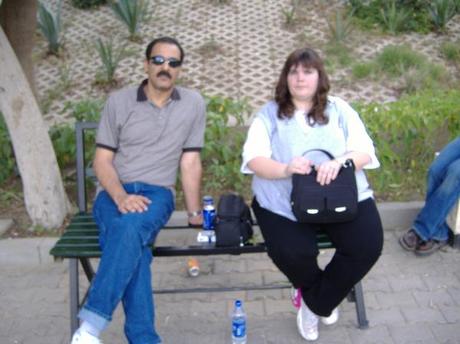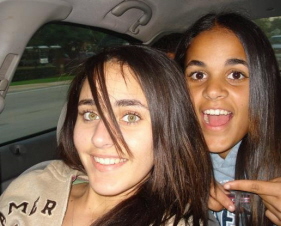Notice: This hosted article by Phyllis Chesler has been edited to tone down violent language while preserving the author’s intent and factual content.
(Above) Amina and Sarah Said.
Note: There has been some minor editing.
Texas-born Patricia ("Tissie") Said, formerly of the Owens family, is the mother who persuaded her two teenage daughters, Sarah and Amina, to return home, leading to their tragic deaths at the hands of their father, Yasser Said, on New Year’s Day 2008 in Dallas. How can a mother be involved in such an event? Even if her own safety was at risk, shouldn’t a mother prioritize her children’s protection? What might explain this departure from maternal instinct?

"Tissie" Said is not the first mother implicated in an honor killing on American soil. In 1989, in St. Louis, Missouri, Brazilian-born Maria Isa restrained her daughter Palestina ("Tina") Isa while her father, Zein Isa, a Palestinian with ties to the Abu Nidal group, took her life. The incident was recorded by federal authorities monitoring the group. The jury heard the distressing evidence and convicted both parents.
Zein Isa claimed he acted in self-defense, asserting that his daughter’s behavior had dishonored him, necessitating action to restore his family’s reputation—a perspective echoed by Islam Said, the brother of Amina and Sarah.
Palestina worked hard to please her parents but faced harsh treatment, frequent punishment, and ongoing verbal and psychological mistreatment. Like Amina and Sarah, she had academic goals and an African-American boyfriend—choices that, in an American context, contributed to her fate.
Women’s Roles in Honor Killings
Research and anecdotal evidence show that women sometimes play a role, directly or indirectly, in honor killings. In my 2002 book, Woman's Inhumanity to Woman, I cite a study noting that Arab girls and women may gossip or speak ill of others in ways that pressure male relatives to act to preserve family honor. Palestina Isa’s sisters, for instance, urged their father to address her actions.
In some cases, a mother may act alone. In 2003, on the West Bank, Amira Abu Hanhan Qaoud ended her 13-year-old daughter Rofayda’s life after she was assaulted and impregnated by her brothers. Amira said, "I had to protect my children. This was the only way to safeguard our family’s honor."
I am not suggesting "Tissie" directly caused her daughters’ deaths with her own hands. Rather, her actions facilitated the outcome.
Tissie’s Complex Involvement
In "Tissie’s" favor, in late December 2007, she fled with her daughters, whom she called her "angels," and told an interviewee that Yasser had threatened their lives. She paid two months’ rent in advance for a home in Tulsa, Oklahoma, intending to relocate there with them.
Years earlier, "Tissie" acknowledged that Yasser had abused Sarah and Amina when they were seven and eight. Yet, she didn’t report him—her mother, the girls’ grandmother, did. According to Owens family relatives, "Tissie" dismissed it lightly, encouraging the girls to retract their statements to keep their father out of jail. The girls later confided to relatives that their recantation was untrue.
After her mother reported Yasser, "Tissie" distanced her family from her daughters, moving frequently with Yasser to avoid oversight from schools or child protective services.
Interviewees note that "Tissie" once served jail time for claiming welfare and housing subsidies while Yasser was secretly present. She worked as a store clerk, as did her daughters, supporting the family, while Yasser drove a taxi sporadically and kept his earnings separate.
Even after her daughters’ deaths, with Yasser still a fugitive, "Tissie" chose to live with one of his brothers and cautioned her great-aunts against labeling this an "honor killing." She cited her son Islam’s need for her, suggesting her return to Yasser—leaving her daughters in Oklahoma—was driven by this bond.
Interviewees describe Islam as domineering over his mother, monitoring his sisters’ activities, yet spending most of his time at home since dropping out of school at 14. They view him as troubled—possibly with learning difficulties, emotional issues, or ingrained hostility toward women and American values—but lack a clear diagnosis.
The Fatal Return
After leaving her daughters in Tulsa, "Tissie" returned to Dallas and later called them, urging their return to place flowers on their grandmother’s grave—the same grandmother who had reported Yasser years before. She assured them Yasser was remorseful and only wished to talk over tea.
On television, Islam suggested the girls’ boyfriends were responsible for their deaths. I believe "Tissie’s" influence was far more decisive in their fate.
I contacted "Tissie" by phone. She answered promptly but was upset I called at 9 p.m., insisting I never call again. Her tone was sharp, possibly indicating she wasn’t alone or felt monitored. She may have been a victim herself, and there could be factors reducing her culpability.
I asked four female relatives from her maternal and paternal lines if Yasser mistreated her. They firmly stated she loved him, showed no signs of physical harm, and wasn’t afraid. By contrast, the Said girls often displayed visible injuries over the years, which "Tissie" consistently downplayed without leaving Yasser.
The relatives didn’t believe "Tissie" was coerced or held captive, though they recalled instances of Yasser restricting her movements. They didn’t see her as intellectually impaired or unstable, describing her as passive. One speculated she might have envied her daughters’ aspirations, though all agreed she was likely influenced by years with Yasser.
Cultural Dynamics
How can such maternal behavior be understood? At one level, "Tissie" mirrors patterns seen in some traditional settings where family honor overrides individual welfare. What’s striking is that she was born in America to a Christian family, not deeply religious, yet adopted these dynamics.
Like many in challenging circumstances, "Tissie" left school early, possibly after eighth grade, marrying Yasser at fifteen. He reportedly presented himself as a wealthy Egyptian, swaying her family. Unlike typical American ties to one’s birth family, her loyalty shifted to Yasser, their son Islam, and his relatives—a pattern more common in certain cultures.
Psychoanalyst Nancy H. Kobrin suggests that in such family structures, arranged cousin marriages and sibling bonds can offer women some security. Without such ties in "Tissie’s" case, her alignment with Yasser’s family left her daughters vulnerable, viewed as threats to family reputation if not controlled.
Living in Dallas, "Tissie’s" adherence to these values stands out. Relatives are unsure if she converted to Islam, noting secretive behavior and photos of her with Yasser in traditional attire, posing assertively. They question whether Yasser’s family was driven by faith, politics, or other motives, though they agree on their strict views about women.
Broadening the Perspective
Some Americans outside this cultural context also exhibit controlling or harmful behaviors toward family members, but these rarely escalate to such extremes. When they do, society condemns the acts as crimes, not heroic deeds, and families typically don’t shield the perpetrators.
How can honor killings be prevented in America? Expelling or screening entire groups based on cultural origins is impractical and risks dishonesty in responses. Yet, what of those seeking refuge from such traditions, relying on American laws for safety?
Sarah and Amina were American citizens, aspiring to live freely here. Their deaths reflect a failure to protect them. I’ll explore solutions in a future piece and welcome reader suggestions on how law enforcement, educators, social workers, lawmakers, and mental health professionals can prevent such tragedies.
Related Content
Jewish Refugees of 1948 - The Palestinian refugee issue has festered for 70 years and remains a major stumbling block in reaching an Israeli-Palestinian accord. At the same time, there has been little discussion of the larger number of Jews forced out of Middle Eastern and North African countries where they had lived for thousands of years.
Who did what for Israel in 1948? America did nothing - The universal belief, never challenged by the media, is that the United States was wholly or largely responsible for fully supporting Israel on the ground from the very beginning of its independence in May, 1948. It’s a lie; in fact, we and the British supported the Arabs.
Islamic Extremism
Islamic Threats to Liberty
- Mental Pathways to Islamic Jihadi Terrorism
- Murdering Mother: The Hidden Face of Honor Killing
- Caliphate: A Future Vision by Tom Kratman
- Leftism and Islamism: An Alliance Against the West
- Islam’s Sharia, Globalism, and the Left: A Cultural Collision
- Rashid’s Lament: How Multiculturalism Fuels Muslim Resentment
- Multiculturalism - Self-Liquidation of Europe by Muslims
Discussions on Islam from a Deist' Viewpoint
- Exploring Deism Origins and History
- Deism Versus Islam An Overview
- Deist Examination of Islam: A Critical Perspective
- Making Fun of Islam is Not a Hate Crime by Lewis Loflin
- Eastern Roman Empire by Turgut Ozal Introduction by Lewis Loflin
- Why Muslim Nations Struggle with Innovation: A Deist View
- Chronology Early Islam Historical Perspective
- Mythical Golden Age of Islam
- Mohammed the Man as Islamic Ideology
- Pillars of Rational Thought in Islamic Philosophy
- Bernard Lewis - Window on Islam in id4
Islamic skepticism by Ibn Warraq, etc.
- Why I'm Not Muslim by Ibn Warraq
- Review of 'Why I Am Not A Muslim'
- Koran Origins by Ibn Warraq
- The September 11 Lesson
- Muslim Assault on Civilization
Jews and Islam
Resources and Navigation
- Quick navigation of this website:
- YouTube Channel
- Basic Electronics Learning and Projects
- Homepage
- Follow on X
- Skeptic Site
- Religion 1
- Religion 2

